A Tribute to My Missionary Parents
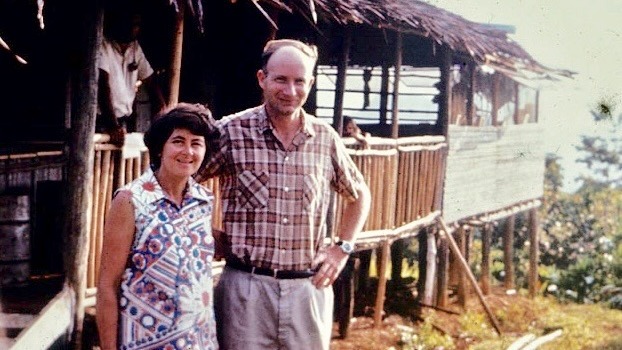
Disclosure: This post may contain affiliate links, meaning Beautiful Christian Life LLC may get a commission if you decide to make a purchase through its links, at no cost to you.
I grew up in the jungle in a remote village in Papua New Guinea (at the time, known as the Trust Territory of Papua and New Guinea). My parents were missionary Bible translators.
My childhood there seemed very “ordinary” to me. I understood, of course, that life in the far-away nation that my parents called home (the USA) was very different from the life that I knew. From pictures I had seen in books, I knew that in America there were tall buildings, paved roads, and lots of cars. I knew about cars—there were a couple of Land Rovers in the small town an eight-mile walk away from the also small village where we lived, and there were some cars at the mission base in the highlands. There weren’t really roads either—four wheel drive vehicles could, with difficulty, navigate the ruts and mudholes of the shovel-excavated trails.
Life without Electricity and Toilets
There was no electricity. When my parents wanted to charge the batteries that powered the two-way radio used to communicate with the missionary base three hundred miles away, they had to run a fuel-powered generator. Any food and medical supplies they ordered arrived every few weeks. My dad (with some New Guinean helpers) had to walk eight miles to the nearest airstrip and eight miles back to get the delivered supplies. We had a large galvanized water tank to catch rain for drinking water. We had no toilets; we had an outhouse about a hundred yards away from the house.
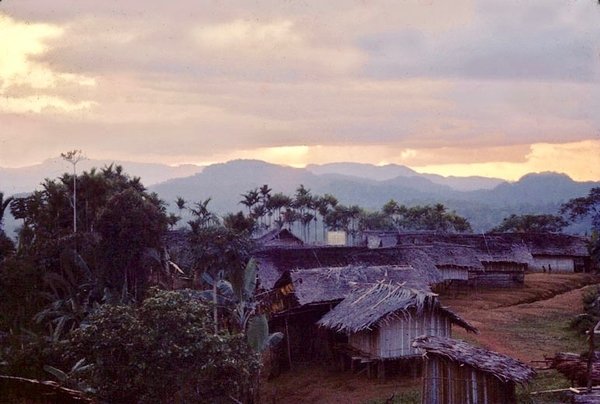
My mom washed clothes in washtubs using water carried up from the stream a quarter mile down the hill. She baked in a mud oven. We lived in a house made of native materials. We lighted the house at night with kerosene lanterns. We slept every night under mosquito nettings. All this was “regular” to me. It didn’t feel unusual. It was just life.
The “everyday” of my childhood was for my mom to be up before dawn. She would read her Bible and pray for at least an hour. She prepared meals and got school assignments ready for her kids. She treated New Guineans who were injured or sick (she was a nurse and kept a stock of medical supplies on hand).
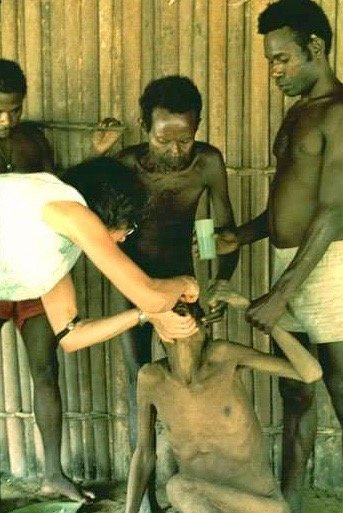
My mom translated Bible stories and told them to the women and children. My dad worked on analyzing the grammar of the language and translating the Bible (my mom helped when she had time—she spoke the language better than he did). They started with the books of Mark and Romans and went on to other New Testament books. Sometimes, my dad took his rifle and went hunting with the New Guineans for birds or wild pigs (the New Guineans generally hunted with spears).
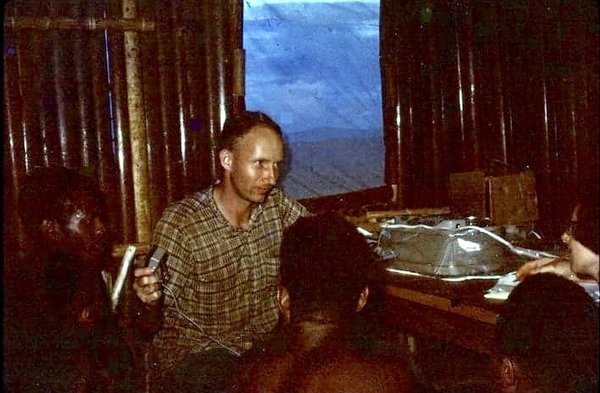
Preaching the Gospel in Remote Places
As an adult I’ve reflected every now and then on what it must have been like for my parents and their missionary colleagues. Having lived here in the United States now for many years, I now have a more visceral sense for how unusual the choice they made was to live in remote villages in Papua New Guinea.
What kind of people—often with multiple graduate degrees and significant opportunities for economic prosperity and security—uproot their lives, leave friends and family behind, and spend two, three, or four decades in remote jungle places where most of the people speak languages that had no dictionary and no grammar books?
What kind of people learn those languages from the people, write those grammars and dictionaries, teach people to read, preach the gospel, give medical treatment, plant churches, translate the Bible into the local language, and do a hundred other things that need doing to preach the gospel in remote places? My parents. Their colleagues. People like them in other places in the world. People who love Jesus—a lot.
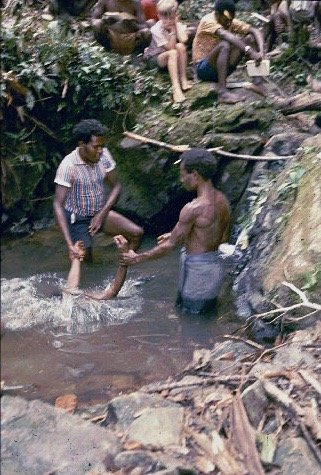
A Gnat on the Shoulders of Giants
When I reflect on the life and work of my parents, I have the increasing realization that, in terms of my faith, I am a gnat on the shoulders of giants. I was given the great gift of living in a school of Christianity: a school that no one wanted to bribe their way into, a school filled with the best teachers available and with the most valuable instruction possible. A school in which I saw lived out—without knowing what I was seeing until later—the faith of those who had seen the kingdom of God from a distance and had decided that teaching people about that kingdom was worth giving up the “ordinary” life they might have had in this world.
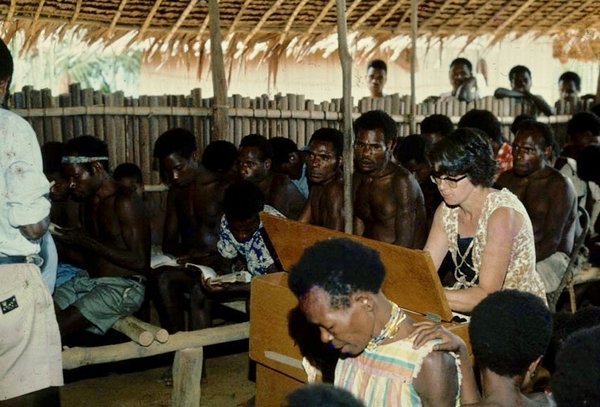
In exchange for that “ordinary life,” they were given extraordinary ones, both in this age and in the age to come. They were God’s holy fools, ordinary people who bore none of the marks of worldly significance or power, but who “threw their lives away” for the sake of the good news of Jesus Christ, and whom God therefore counts as wise.
Ordinary People Living for Christ
They were not unusual people in many ways. They had all of the same failings that we all do. They got tired. They had good days and bad days. They lost their tempers sometimes. They sometimes doubted whether they had done the right thing. They were often lonely. They were afraid at times, especially when funds ran low (although God always provided, in small, but often miraculous ways). They had their quirks.
But they knew God and loved him deeply. They preached Christ crucified. In them, in all of their ordinariness, with all their quirks and flaws, I caught glimpses of the beauty of Jesus: a beauty that goes to extraordinary lengths to reconcile people to God. When my father was dying from cancer in 2005, he was so blessed when a missionary colleague called him to tell him that the church in Naineri—the village near Amanab in which he had won his first converts and where he had trained elders and pastors—was still strong.
I am so grateful, and enormously humbled, for the great gift of having had such radical, ordinary people for parents and “aunts and uncles” (that’s what we kids called other missionaries we knew at the missionary center in the highlands where, after the seventh grade, we went to boarding school).
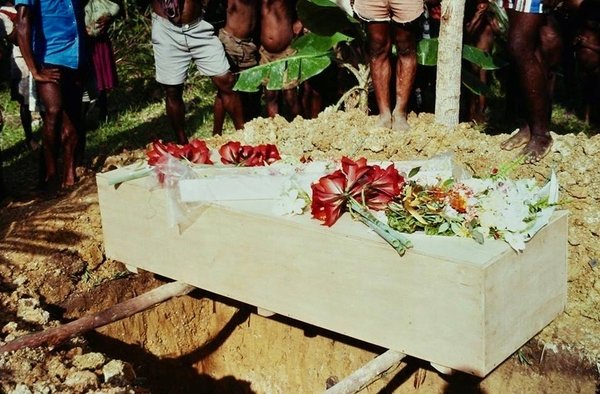
My parents have died—my mother while working in the jungle. The generation of my parents is now old. They are passing from the scene. They have gone, or are going, to the Lord they have loved their whole lives. They are giants. I am humbled by their faith. And I look forward on Resurrection Day to seeing them see the results of their labors.
Jesus said, “Truly, I say to you, there is no one who has left house or brothers or sisters or mother or father or children or lands, for my sake and for the gospel, who will not receive a hundredfold now in this time, houses and brothers and sisters and mothers and children and lands, with persecutions, and in the age to come eternal life. But many who are first will be last, and the last first.” (Mark 10:29-31)

This article was originally published on May 6, 2019.
Related Articles:
- Say Yes to the Best Offer Ever: Receive Jesus for Free
- What Does It Mean to Have a New Identity in Christ?
- Heaven Bound: 2 Important Things to Remember to Develop an Eternal Mind-Set
- 2 Kinds of Cheap Grace You Need to Avoid
Recommended:
Better Than We Dreamed: The Story of Elaine Townsend by Simona Gorton

